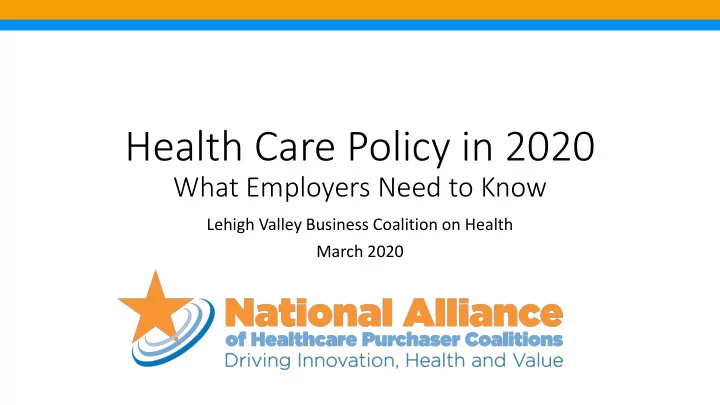

Health Care Policy in 2020 What Employers Need to Know Lehigh Valley Business Coalition on Health March 2020
Agenda • Brief History of the ACA – How did we get here? • Proposals to replace/reform the ACA – What did and didn’t happen? • New proposals under discussion by presidential candidates • Other policy implications for employers
Brief History of the ACA • Enacted on March 23, 2010 • Passed Congress through budget reconciliation process; no bi-partisan support • Effective date for most major provisions was 2014 • First open enrollment period for Marketplaces: November 2013 – March 2014 • Enrollment slow to start, increased slightly in the first few years, and has remained stable in recent years at about 20 million • US Supreme Court ruling on ACA’s constitutionality ( NFIB v. Sebelius ): June 2012 • Coverage mandates constitutional • Mandatory Medicaid expansion unconstitutional
Brief History of the ACA • Cadillac Tax repeal (Consolidated Appropriations Act, 2020) • But no “pay-for” • Tax Cuts and Jobs Act of 2018 • Individual mandate penalty reduced to $0; is entire law invalid now? • Federal court case currently at 5 th Circuit Court of Appeals
Proposals to Replace/Reform the ACA – Congress (2011-2017) • 2011: Republicans gain majority in House of Representatives • Repealing the Job-Killing Health Care Law Act • House passed 245–189 • Bill was offered as an amendment to an unrelated bill in the Senate, but was voted down • 2012: After ruling in NFIB v. Sebelius, House held another (largely symbolic) repeal vote • 2013: ACA repeal tied up in government shutdown • House Republicans refused to fund the federal government unless accompanied by delays and changes to multiple provisions in the ACA • 2015: Restoring Americans' Healthcare Freedom Reconciliation Act of 2015 • Would have repealed individual and employer mandates; repeal Cadillac Tax • House passed using budget reconciliation • Amended version passed in Senate, sent back to House, which passed again • Vetoed by President Obama; House failed to override veto • 2017: Republicans gain majority in Senate
Proposals to Replace/Reform the ACA – 115 th Congress (2017-2018) Bill Major Provision(s) Senate Action House Action S. Con. Res. 3 Allowing the repeal of the Affordable Care Act through the budget Passed 51-48 N/A reconciliation process American Health Care Repeal mandates, replace with late enrollment penalty; allow age rating None (see ANSs Passed on Act (HR 1628) up to 5:1 unless state adopts different ratio; encourage use of HSAs by below) May 4, 2017 increasing limits Better Care Create association health plans (SBHPs); increased flexibility for states Discussion draft N/A Reconciliation Act under 1332 waivers, including EHB changes proposed on June 22, (ANS HR 1628 ) 2017 Obamacare Repeal Eliminates Medicaid expansion; encourage use of HSAs by eliminating Posted on the Senate N/A Reconciliation Act the increase in tax penalty for non-qualified HSA withdrawals; eliminate Budget Committee (ANS HR 1628) tax credits for low-wage small employers web site on July 19, 2017 Health Care Freedom Act Repeal ACA individual mandates, and suspend employer mandate from Defeated 49–51 on N/A (ANS HR 1628) 2016 until January 1, 2025; encourage use of HSAs by increasing limits July 27, 2017 up to annual out-of-pocket limit under qualified high deductible health plans
Proposals to Replace/Reform the ACA – Trump Administration • Executive Order 13765: Minimizing the Economic Burden of the Patient Protection and Affordable Care Act Pending Repeal • Signed January 20, 2017 • Medicaid work requirements • Federal litigation ongoing • Cost-sharing reductions ended • Issuers are now “silver-loading” • Short-term limited-duration insurance • Association health plans • Eliminate funding for assister programs
Presidential Candidate Proposals • Medicare for All/Single Payer • End of private insurance, including ERISA/employer-provided coverage • Higher taxes on middle class, but offset by elimination of health care costs paid by individuals and families • Public Option • Buy-in to Medicaid (w/ no income restrictions) • Buy-in to Medicare (w/ no age restrictions) • Private insurance remains in place, but public option open to those who are offered employer insurance • May eventually result in single payer if public option truly competes with private
Other Employer Implications • Surprise Billing • Coalition Against Surprise Medical Billing • Prescription Drug Costs • Employers Rx • HRA changes • IRS Guidance published July 2019 • Coverage of preventive care for chronic diseases • Direct contracting/narrow networks • Other value-based payment arrangements • Price Transparency • CMS rules: Hospital Price Transparency and Transparency in Coverage
Recommend
More recommend